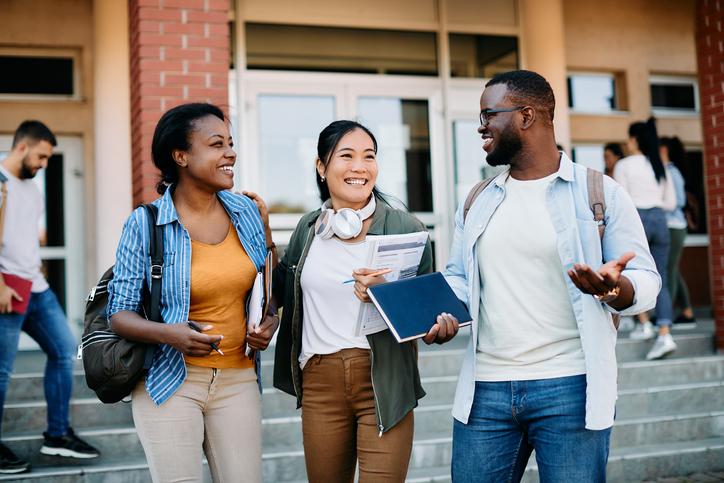
Build students’ sense of belonging to build graduate skills

Helping students settle in well and develop a sense of connection at university is important in ensuring they attain and achieve. Belonging is also strongly connected to inclusion and mental health. Since students can vote with their feet and move elsewhere if they don’t settle, helping them develop a sense of belonging has institutional as well as personal significance. Belonging has multiple dimensions – including social, surroundings, academic and personal space. The social element includes relationships with staff and other students. As well as making time at university more enjoyable and enabling the development of networks important for the future, these relationships also enable peer support and collaborative learning. The campus design itself may encourage such connections to develop and flourish, for example through informal spaces allowing students to meet, talk and work together.
- How to foster belonging to advance equitable learning in your classes
- Resource collection: What’s in a name? The importance of getting students’ names right
- Universities must do better at bridging the gap between diversity and belonging
The pandemic affected sense of belonging
The Covid-19 lockdowns meant that attendance on campus was disrupted by the move to online teaching. This is turn impacted the ability of students to meet and socialise, negatively affecting their relationships both with other students and staff. In our own institution we saw a reduced sense of belonging among staff and students as a consequence of the shift to online teaching and learning. The pandemic shone a spotlight on the importance of developing and strengthening relationships in higher education. We all experienced teaching “into the void”, faced with impersonal images of students with their cameras off, unsure if they had logged on and checked out. There is a real sense of disconnect for both staff and students in this experience – no eye contact to be made, no body language to be read. Perhaps that is among the most important lessons from the pandemic – that the value of human connection, even if fleeting and superficial, is difficult to replace.
Post-pandemic impacts
However, even post-pandemic it seems that far from flocking back to campus, attendance at synchronous face-to-face sessions is low. There may be several reasons for this, including the cost-of-living crisis, which has hit students hard. The need to work alongside study to make ends meet does not help, but with many students commuting to university the cost of transport may also play a part. Since many institutions have adopted blended learning approaches, or at least offer audio recordings of live sessions, students may not necessarily see the benefits of attending classes in person, instead opting to catch up later online.
There are dangers to this of course; just because a resource is available online does not mean it is accessed, or that the material is correctly interpreted or fully understood. However, from the perspective of belonging, not attending may also reduce the connections that a student develops within their higher education institution, their relationships with staff and peers being more difficult to establish and maintain. In addition, if non-attendance is higher in some groups than others this may contribute to inequities between students.
Encouraging a sense of belonging
So, how can we encourage a sense of belonging in both staff and students in this brave new world? Knowing our students’ names and pronouncing them correctly so that interactions can be personalised, is one way – especially helpful if teaching is online. Encouraging student interaction through participatory group activities will enable them to develop relationships with each other, building their confidence in their ability to contribute and the value of their contribution. While this is true both for synchronous and asynchronous classes, maximising group work opportunities in face-to-face sessions will help students understand the benefits of attending, rather than using recorded sessions to catch up later.
Enabling students to make authentic contributions based on their lived experience is also valuable since it explicitly invites student input and values diverse contributions. In my field of nutrition it is easy to see how student input can be gathered, since everyone eats and has experience of food. For example, I invited students and staff to share recipes that were personally meaningful to them, together with the stories of why those recipes mattered in a pilot project carried out during the lockdown in 2020. Participants felt valued by being invited to contribute and the themes that arose from the project related to several aspects of belonging – such as inclusion, friendship and acceptance. Taking part in the project significantly increased sense of belonging to the institution.
It is worth exploring opportunities to allow students to share perspectives derived from their own lived experience and disciplines, within small groups. If this can be established across disciplines it replicates real life, since graduates frequently work in multidisciplinary teams. It also encourages creative problem-solving approaches to wicked problems such as sustainability, which cannot be addressed by single disciplines.
Discussions can be married with technology (for example, group contributions captured using tools such as Padlet) but encouraging students to talk and contribute directly allows those important relationships to develop and strengthen. Managing this within large courses, where multiple staff may be needed to run sessions, is more logistically challenging than in small groups. Approaches such as hackathons and debates may be used but are also likely to need multiple staff to help them run smoothly. Nonetheless, feeling welcome and at home may be more difficult for students in large courses so arguably this is an investment worth making.
Helping students settle in well, encouraging them to contribute, developing their communication and problem-solving skills and igniting cross-disciplinary thinking may all contribute to belonging, but they also contribute to graduate skills.
Hilda Mulrooney is associate professor in nutrition at Kingston University.
If you would like advice and insight from academics and university staff delivered direct to your inbox each week, sign up for the Campus newsletter.


